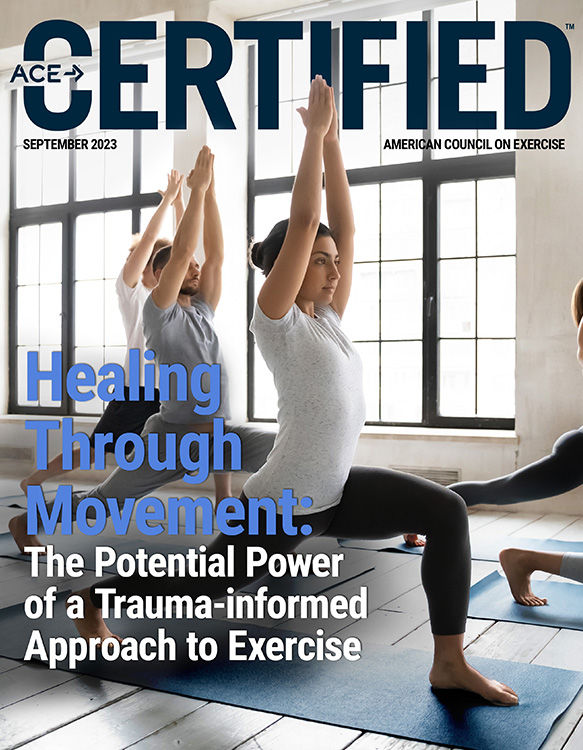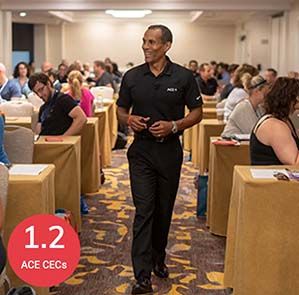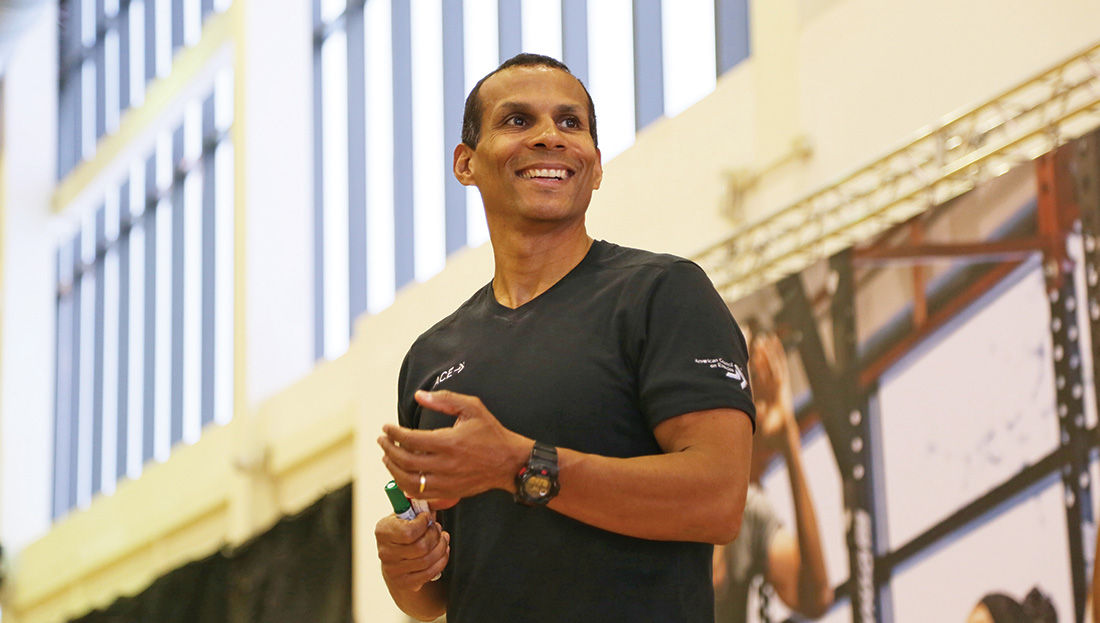
“But I’ve never spoken in public before!” All too often, this is the response I get when I encourage a health and exercise professional to consider taking their business to the next level of self-growth and professionalism, not to mention income potential, by sharing their knowledge and experience through public speaking. And my reply? “But I never spoke in public before either…until I started speaking in public!” Every public speaker, even the most prolific and experienced ones, start from that same place: zero experience. This is as true for those who have given a thousand speeches as it is for those who fear public speaking more than death.
It’s not surprising, therefore, that so many people, even those with “natural born” public speaking talent, might shy away from the idea of speaking in front of an audience. In fact, this fear is often based on a faulty assumption that one’s first public speaking engagement will be in front of an audience of hundreds. That’s enough to scare any first-time speaker away and explains, in part, why the idea of public speaking strikes fear into the hearts of so many.
As you can probably guess by now, the purpose of this article is to dissect those fears and show you how and why public speaking can be a great way to grow your business and expand your reach as a health and exercise professional. Public speaking is not the end goal; rather, using public speaking to get your message of health and wellness in front of more people while also increasing your income potential are the whys that make the effort to learn how to comfortably speak in front of others so worthwhile.
How to Gain the Skills You Need
If you’re serious about exploring your potential as a public speaker, your first gig will almost always be before a small crowd of friendly and often familiar faces. For example, your first speaking engagement might take place at a church, synagogue, mosque or temple you belong to, a neighbourhood association in your community, or even a workplace staff meeting. Knowing you have a supportive audience that is rooting for you can be a great way to boost your confidence. Moreover, to help allay those first-time fears even more, your first speech will almost always be unpaid, which serves to eliminate any anxiety you may have that your speech is not good enough to merit financial compensation. That will come in due time, which is something I can personally attest to.
In fact, my personal experience began at arguably one of the best places to gain the skills to speak confidently in public: Toastmaster’s International, one of the world’s largest and most respected organizations devoted to mastering the craft of public speaking. While no toast is served at Toastmaster’s, what is served are heaping portions of practice time, all before an audience of like-minded and highly supportive colleagues ranging from first-time presenters to seasoned speakers. Best of all, each Toastmaster’s chapter not only affords newcomers unlimited opportunities to practice public speaking, but to practice and learn the essential art of public speaking evaluation as well, which is a critical tool in developing one’s talent to skillfully perform in public. Personally, I am grateful to Toastmaster’s for giving me so many opportunities to realize my potential as a public speaker. It can do the same for you.
Brad Schoenfeld, PhD, CSCS, Professor of Exercise Science at Lehman College in the Bronx, NY, and a highly sought-after public speaker in the strength-training community, honed his own oratorical skills through Toastmasters International, as well. “It’s a great public speaking organization that taught me things to do and things not to do to improve my presentation skills,” he explains.
In addition to extolling the benefits of joining Toastmaster’s, Dr. Schoenfeld offers more wise words for those of you who might be considering your first public speaking engagement. “Develop a platform, like a social media presence,” he suggests. “People need to know about you. This can be very beneficial in terms of people wanting to hear you speak. And have a good PowerPoint [presentation], too.”
Share What You Know With Who You Know
Dr. Schoenfeld shares another key to success in public speaking: “Know your material! If you’re not confident about your knowledge, you will not go over well [with your audience].”
Your knowledge base is vast, which is why health and exercise professionals like you have the potential to excel as a public speaker. Whether you are a personal trainer, group fitness instructor or health coach, you are a wealth of information and are likely already an expert in your particular niche or area of expertise. What excites you to talk about? What do you have a passion to share with people that relates to healthy living? Choosing what you want to talk about and to whom you want to speak are the two primary questions you need to answer for yourself.
Of course, you also need to know your audience. The audience you select needs to be a good fit for the material about whic you want to speak. So, who are these audiences and where do you find them? If you are new to public speaking, you may want to start by addressing a general audience of “everyday” people who need guidance on things like how to start an exercise program, develop healthy eating habits or practice self-care. Sure, everyone knows these are important, but how many people even know where to begin? This is an easy, non-intimidating point of entry for you into the public speaking market. You can begin to hone your skills at a Toastmaster’s chapter or, as Dr. Schoenfeld suggests, you might offer your speaking services to your local Rotary International Club or Lion’s International Club, community organizations such as a local YMCA, or social organizations such as the Junior League or a local chapter of AARP.
The Benefits of Starting Small
One of the easiest, friendliest and most welcoming environments to jumpstart your public speaking career is your local public library. That was my “go-to” destination once I felt comfortable enough to take the lessons I had learned from Toastmaster’s and put them to the test in front of a public audience.
Why the library? As a health and exercise professional, your expertise in the field is in high demand, and marketing yourself as an expert is key to your public speaking success, according to David Farrow, Founder and CEO of Farrow Communications, a public relations and digital marketing firm in Buffalo, NY. “Start small,” Farrow also advises first-time speakers, and “know what your customer (i.e., your audience) is in need of.”
You possess the knowledge that people want (and need) to hear. Everyone knows about the benefits of regular exercise and the importance of a healthy diet, yet few people know how to exercise or how to eat healthfully. With your career background and experience, you can share what you know with an eager public.
Additionally, libraries are often looking for trending, topical presentations to offer to their patrons, and few topics are more trending and topical these days than health and wellness. In fact, you might even get paid for your speaking engagement. I did. I requested compensation of $100 for my hour-long lecture and my request was approved. I was officially on my way toward becoming a paid public speaker.
It's important to remember, however, that even if you speak for free, your time is worth the effort. “It’s all about publicity,” encourages Farrow. It’s about getting your name out and creating “word of mouth.”
This is the approach that worked for Pam Moore, a nationally recognized health and fitness writer, public speaker and intuitive eating coach. “When I gave a free talk, someone in the audience told another person about my presentation and that person contacted me and hired me to give a lecture.”
Speaking for free is also a great way to gain a social media following, Moore emphasizes. “And know your ‘why,’” she adds. Why are you speaking? What will your audience learn and take home from your speech? Moore likens this to gift giving. “What gift will you give to your audience through your speech?” Visualizing your presentation as a gift is a highly effective way to make your presentation as meaningful as possible. After all, at its core, a gift is a meaningful expression of ourselves. Ultimately, that’s why we speak—to share ourselves, our knowledge, our enthusiasm and our inspiration with others.
How to Leave a Lasting Impression
As much as we want our gift of speech to leave a positive impression, how can we determine if our presentation makes the impact we want and intend it to? By soliciting audience feedback, says Dr. Stuart Phillips, Professor of Kinesiology at McMaster University in Hamilton, Ontario, Canada, and Director of McMaster’s Physical Activity Centre of Excellence (PACE). “Seek constructive feedback from your audience and accept positive outside criticism,” he advises the novice speaker. Moreover, he stresses, “be humble.” Accepting critical feedback is never easy but it is fundamental to sprouting your talent. Kind words and kudos are always appreciated and feed the ego, but they don’t provide the constructive guidelines needed to improve. For this reason, Dr. Phillips encourages novice speakers to proactively seek out feedback, graciously, gratefully and with humility.
Before you even step behind the lectern to give your first speech, “pull your friends together and practice in front of them,” suggests Maureen (Mo) Hagan, Chief Operating Officer of canfitpro, Canada’s leading fitness education authority, and creator of canfitpro’s “Women Who Influence.” Practicing in front of friends is a great way to address any fears and anxieties of performing in public. “If you can do it in front of your friends, you can do it anywhere,” explains Hagan. “Ask for their feedback and apply that feedback to your presentation.” Once your speech is done, give audience members the option to complete a brief pen and paper survey to evaluate your speech.
Borrowing on decades of her own public speaking career, Hagan offers three more nuggets of advice for any health and exercise professional who wants to expand their career into public speaking:
- Put yourself on Zoom. Record yourself giving a presentation, then watch the playback while evaluating your speech to see where and how you need to improve.
- Remove up to 30% of your prepared text. Paring down your delivery not only guarantees you will stay within your time limit, but when you periodically pause your presentation, especially after a key point in your speech, the silent space you create allows your audience to fully absorb the impact of your words in a powerful and emotional way enhancing the bond you create with the attendees.
- Go to conferences, watch presenters speak and take notes of their presentation. Study the speakers who you want to be like. Schoenfeld suggests attending the annual conferences of the National Strength and Conditioning Association (NSCA), the American College of Sports Medicine (ACSM) and IDEA Health and Fitness Association.
Ultimately, regardless of which group you choose to speak to for your first presentation or which path you take to refine your public speaking skills, consider following the wise words of Lawrence Biscontini, MA, an award-winning fitness industry expert and mindful movement specialist based in Mykonos, Greece: Just “start speaking! [Start with] 10 minutes and work up from there,” he advises. You’ll be surprised how quickly 10 minutes pass, and how much self-assurance you can build from keeping it short, simple and sweet.
By following the advice of Biscontini and the others quoted in this article, your “Me? A public speaker?” response will undoubtedly and confidently morph into “Me! A public speaker!”
Expand Your Knowledge
Creating Connections: Speaker’s Academy for Fitness Professionals
Designed specifically for health and fitness professionals, this interactive, three-month course presented by ACE and IDEA will give you the experience you need to differentiate yourself as a professional who’s equally confident when training clients one-on-one, leading group training sessions, or speaking to large audiences at events.
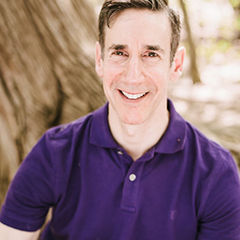




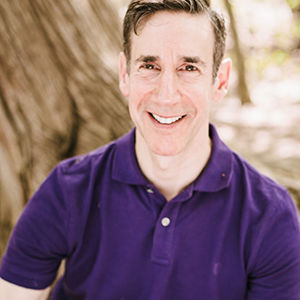 by
by 